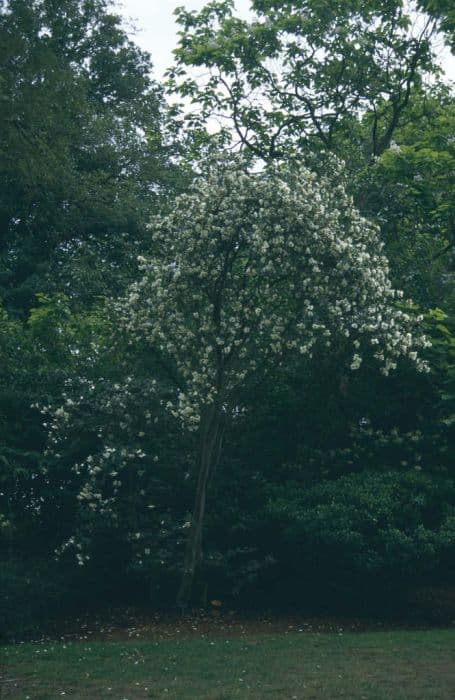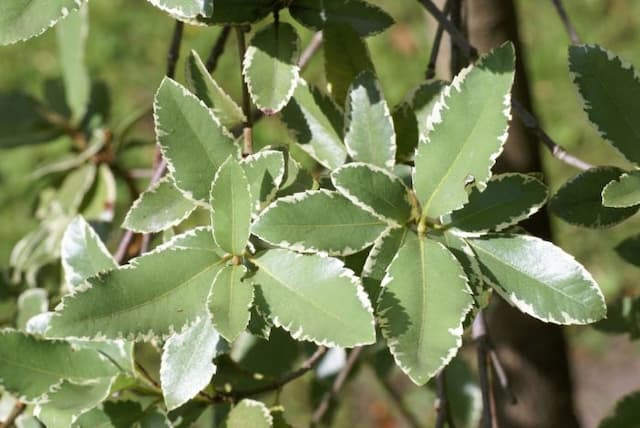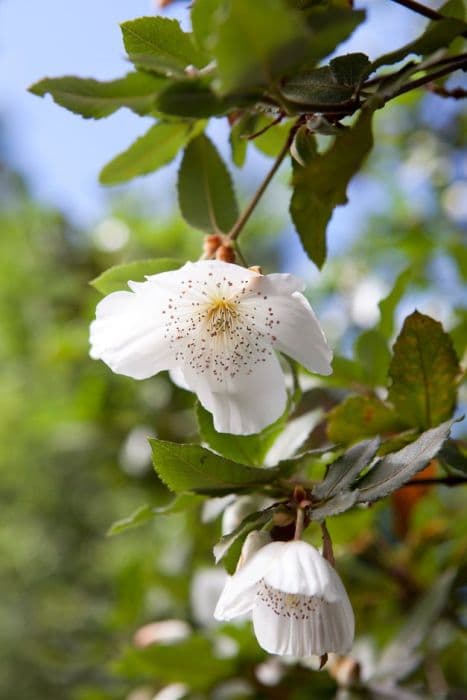Leatherwood 'Pink Cloud' Eucryphia lucida 'Pink Cloud'

ABOUT
'Pink Cloud' is a columnar, evergreen tree with oval, glossy, dark green leaves and saucer-shaped, pale pink flowers with a dark pink eye, produced in early and midsummer
About this plant
 Names
NamesFamily
Cunoniaceae
Synonyms
Leatherwood, Pink Cloud Tasmanian Leatherwood
Common names
Eucryphia lucida 'Pink Cloud'.
 Characteristics
CharacteristicsLife cycle
Perennials
Foliage type
Evergreen
Color of leaves
Green
Flower color
Pink
Height
20 feet (6 meters)
Spread
10 feet (3 meters)
Plant type
Tree
Hardiness zones
9
Native area
Tasmania
Benefits
 General Benefits
General Benefits- Ornamental Appeal: Leatherwood adds aesthetic value to gardens with its attractive pink flowers.
- Habitat Support: Provides food and shelter for various species of birds and insects.
- Drought Tolerance: Once established, it can withstand periods of low water availability.
- Shade Tolerant: Can grow in partially shaded areas, offering flexibility in landscaping.
- Low Maintenance: Requires minimal upkeep once established, ideal for gardeners seeking low-maintenance plants.
- Evergreen: Keeps its leaves throughout the year, ensuring constant foliage cover.
- Pollinator Friendly: Flowers attract bees and other pollinating insects, aiding in the pollination of nearby plants.
 Medical Properties
Medical PropertiesThis plant is not used for medical purposes.
 Air-purifying Qualities
Air-purifying QualitiesThis plant is not specifically known for air purifying qualities.
 Other Uses
Other Uses- Eucryphia lucida 'Pink Cloud' can be used as a natural insect repellant in gardens due to its strong scent that some pests find off-putting.
- The wood of the Leatherwood plant is durable and resistant to rot, making it suitable for fine woodworking, such as crafting small decorative items or inlays.
- Due to its dense foliage, Leatherwood can act as an effective privacy screen or hedge when grown in a row along a boundary.
- The blossoms of Leatherwood are sometimes used in floral arrangements, especially for occasions such as weddings due to their delicate and appealing appearance.
- Leatherwood can be planted in urban areas as a street tree, thanks to its ability to tolerate pollution and confined soil spaces.
- Beekeepers may value Leatherwood trees in their gardens as they provide a rich source of nectar during blooming season for honey production.
- Bark and leaves of the Leatherwood could be utilized in natural dye production, imparting a range of tannin-based colors to fabrics.
- Leatherwood's dense canopy can provide beneficial understory habitat for smaller bird species, offering protection from predators and elements.
- Landscapers might use Leatherwood for erosion control on slopes due to its extensive root system which helps stabilize the soil.
- Artists can utilize the Leatherwood flowers as subjects for botanical illustration or photography, capturing their visual appeal across various media.
Interesting Facts
 Feng Shui
Feng ShuiThe Leatherwood is not used in Feng Shui practice.
 Zodiac Sign Compitability
Zodiac Sign CompitabilityThe Leatherwood is not used in astrology practice.
 Plant Symbolism
Plant Symbolism- Resilience: Eucryphia lucida 'Pink Cloud', commonly known as 'Leatherwood', often grows in challenging environments, symbolizing the ability to withstand adversity and bounce back.
- Rarity and Uniqueness: Because 'Leatherwood' is not as commonplace as other plants, it can represent the uniqueness or rarity of a situation or individual.
- Purity: The white flowers of the standard Leatherwood can signify purity, and though 'Pink Cloud' has pink flowers, it can still convey a soft version of this meaning.
- Australian Heritage: As a plant native to Tasmania, Leatherwood carries symbolic meanings related to the Australian natural heritage and identity.
- Renewal: The flowering of 'Leatherwood', particularly after fires, can symbolize renewal or new beginnings.
- Natural Beauty: The delicate pink blossoms of 'Pink Cloud' can represent natural beauty and the appreciation of it.
 Water
WaterLeatherwood or 'Pink Cloud' should be watered deeply to ensure moisture reaches the root zone, typically this means applying 1 to 2 gallons of water for small to medium-sized plants. Young plants need watering about once a week during dry periods, while established plants can be watered less frequently, depending on the climate and soil conditions. During the growing season, increase the frequency, but allow the soil to dry out slightly between waterings. In winter, reduce watering to prevent waterlogging, especially in areas with heavy soil or poor drainage.
 Light
LightLeatherwood thrives best in a location with partial shade to full sun exposure. The ideal spot would have morning sunlight and afternoon shade, or dappled sunlight throughout the day. Protect the plant from intense midday sun, which can scorch the leaves, especially in hotter climates.
 Temperature
TemperatureLeatherwood prefers a temperate climate with temperatures ranging between 50°F and 80°F. It can withstand occasional dips down to 20°F but should be protected from prolonged freezing conditions. Ideal growing conditions are achieved within the temperature range of 60°F to 75°F.
 Pruning
PruningPrune Leatherwood after it has finished flowering to maintain its shape and promote more blooms for the following season. Pruning should be done lightly once a year, as the plant does not respond well to heavy cutting. The best time for pruning is late summer or early fall, immediately after blooming has ceased.
 Cleaning
CleaningAs needed
 Soil
SoilLeatherwood thrives in well-draining, moist soil with high organic matter content. A mix of two parts peat or coco coir, one part perlite or pumice, and one part fine bark is ideal. It prefers a slightly acidic to neutral pH, between 5.5 and 7.0.
 Repotting
RepottingLeatherwood generally requires repotting every 2-3 years or when it outgrows its current container. It's best to repot in spring before new growth starts.
 Humidity & Misting
Humidity & MistingLeatherwood benefits from moderate to high humidity levels, ideally between 50-70%. Maintaining this humidity helps support its glossy foliage and overall health.
 Suitable locations
Suitable locationsIndoor
Place Leatherwood in bright, indirect light indoors.
Outdoor
Use partial shade and shelter Leatherwood outdoors.
Hardiness zone
8-10 USDA
 Life cycle
Life cycleEucryphia lucida 'Pink Cloud', commonly known as Leatherwood, begins its life cycle as a seed, typically dispersed by wind or animals. Upon germination, the seed develops into a seedling, where it establishes roots and shoots that will form the foundation of the plant. As the seedling matures, it enters the vegetative stage, characterized by the growth of leaves, branches, and a sturdy stem; during this time, the plant focuses on accumulating resources and increasing in size. After several years, when the plant has grown sufficiently and environmental conditions are favorable, it enters the reproductive stage, where it produces its distinctive pink flowers, which in turn attract pollinators such as bees and help ensure the success of seed production. Following pollination, seeds develop and are eventually shed from the parent plant, ready to initiate the next generation. Throughout its life, Leatherwood may experience multiple flowering and seeding cycles, contributing to the perpetuation of the species.
 Propogation
PropogationPropogation time
Spring-Summer
The most popular method to propagate Eucryphia lucida 'Pink Cloud', commonly known as Leatherwood, is through semi-hardwood cuttings. This process is typically carried out in the late summer. Cuttings, which are segments of stem taken from the current year's growth, should be about 6 to 8 inches (approximately 15-20 centimeters) long. Each cutting should have at least two or three sets of leaves at the top. The bottom leaves are removed, and the cut end is dipped in rooting hormone to encourage root development. The prepared cuttings are then planted in a moist potting mix and kept under high humidity and indirect light until roots have developed, a process that can take several weeks to months. It is important to maintain a consistent moisture level in the soil without saturating it to prevent rot.



